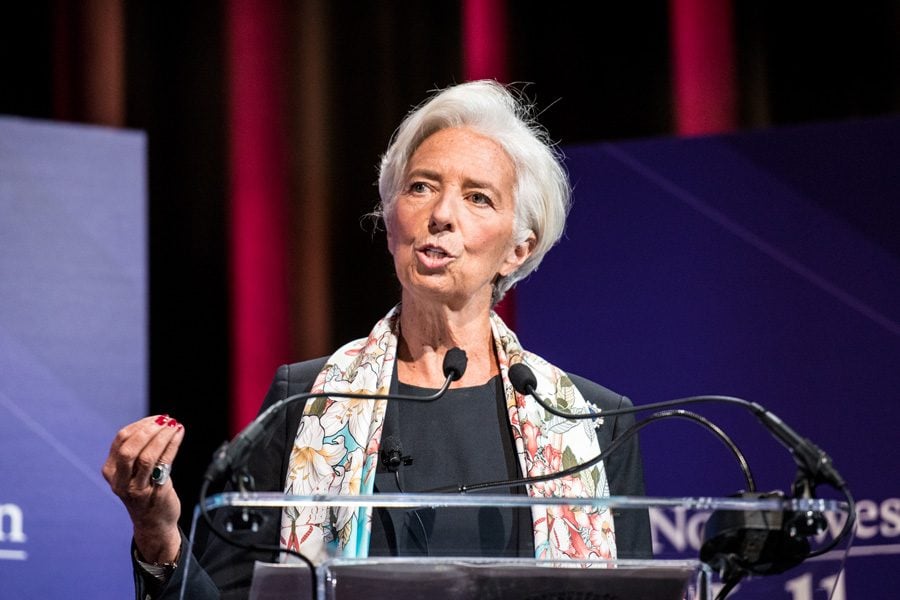IMF director Christine Lagarde defends globalism in Kellogg lecture
Colin Boyle/The Daily Northwestern
Christine Lagarde discuss economic policy during a lecture at Cahn Auditorium on Wednesday. The managing director of the International Monetary Fund stressed the importance of free trade to continued economic growth.
September 28, 2016
Christine Lagarde had sharp words for economic policy makers around the world.
“Restricting trade is a clear case of economic malpractice,” the director of the International Monetary Fund said Wednesday at Northwestern. “Rather than helping those sectors of the economy it means to protect, shutting off trade would deny families and workers important economic opportunities.”
Speaking to a Cahn Auditorium crowd of about 600, most of whom were Kellogg students, Lagarde laid out her vision for the future of economic growth and the steps necessary to achieve her goals ahead of next week’s IMF and World Bank annual meetings. Lagarde did not directly address the upcoming U.S. presidential election, but touched on many of the economic issues raised by the major party candidates during their campaigns.
Trade stood out the most among those topics. Republican presidential nominee Donald Trump has campaigned as an economic protectionist, vowing to strong-arm China and renegotiate long-standing free trade agreements. Democratic nominee Hillary Clinton, meanwhile, has backed off her previous support of the Trans-Pacific Partnership, a trade agreement between the U.S. and 11 other nations.
Lagarde indirectly repudiated both candidates, defending TPP as an engine of economic growth and stressing the importance of free and open trade.
Lagarde also tackled income inequality, saying the IMF supports the implementation of a higher minimum wage and the continuation of the earned income tax credit in the U.S.
“Government must work harder to make growth inclusive,” she said. “We can’t be happy with too low for too long benefitting too few.”
The U.S. comprised just one part of Lagarde’s global economic outlook. Lagarde spoke optimistically about growth in the developing world, saying increases in gross domestic product would level off but continue over the next decade and adding that Russia and Brazil — two once-great economic powers — were back on upward trajectories.
She cautioned the developed world to not be complacent as it continues to recover from the Great Recession. Lagarde listed off structural, fiscal and monetary levers these nations could pull to continue to “move the needle in the right direction.”
Lagarde began her career in policy in 2005 when she joined the French government as minister for foreign trade. In 2007, she became the first female finance minister of a G7 country, and in 2011 became the first female managing director of the IMF. She came back to her experience as a woman in business several times throughout her speech to emphasize the importance of female economic empowerment as a driver for future economic growth, especially in developing countries.
After concluding her prepared remarks, Lagarde participated in a brief Q&A moderated by CNBC journalist and Northwestern alumna Sara Eisen (Medill ‘08). Eisen prodded Legarde on her outlook, joking about “another depressing speech on the economy,” but Legarde stayed positive as she answered audience questions on the future of global trade and the economic impact of the Syrian refugee crisis.
Lagarde garnered smatterings of laughter and applause throughout the lecture from the business-minded crowd. Kellogg student Krishna Kanimerakala appreciated her unique perspective.
“I really loved it,” Kanimerakala said of the talk. “I never really thought about things that drive the IMF decision-making process.”
Email: [email protected]
Twitter: @BobbyPillote


